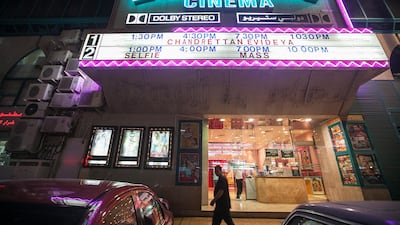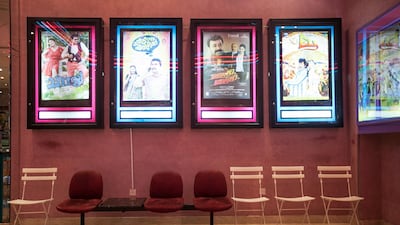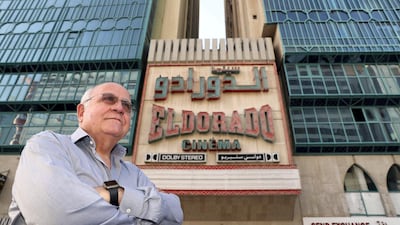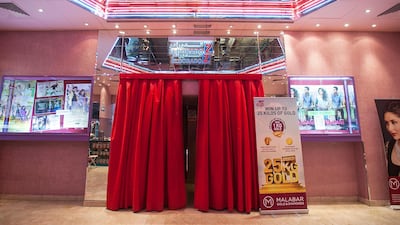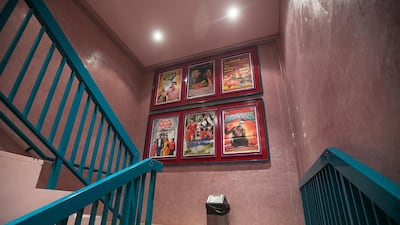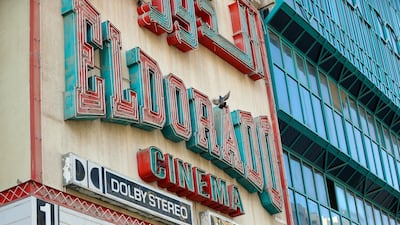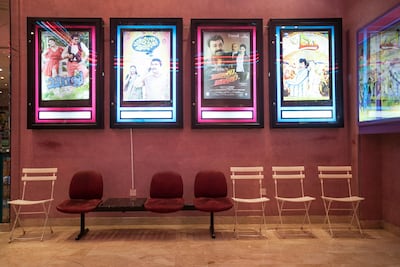After nearly half a century, Abu Dhabi’s first indoor cinema shut its doors and switched off the pink and blue neon lights that have brightened Electra street for decades. El Dorado, Indian movie house, named for a Beirut theatre, was a place for all and would have celebrated its 47th anniversary this week.
The men who built it can still remember when it opened its doors to the public for the first time on November 22, 1970.
The city’s engineers, doctors and lawyers had all come to share that moment in Abu Dhabi’s history, dressed in their finery to watch Patton, the 1970 Academy Award winning film about the American World War Two General.
Just as the audience settled down into their chairs, the power went out.
“Freddy. Freddy, where are you?” called a voice in the dark.
It was Atef Karam, the cinema’s owner.
Ferdinand Lama came running.
“There was sabotage done,” said Karam.
Three fuses had been stolen from the mains.
“Don’t worry,” said Lama, the cinema’s air conditioning engineer. “Get me nails.”
The nails did the trick, the power came back, audiences were enthralled.
“From then on, we enjoyed the movies.”
Lama met Karam in 1969, a year after graduating as an engineer from the American University of Istanbul. Originally from Jerusalem, Lama had arrived from Jordan on the advice of his twin Francois who had moved to Abu Dhabi in 1967. Before that, Lama only knew Abu Dhabi as “somewhere beyond Bahrain”.
It wasn’t a capital city yet. The United Arab Emirates would not exist as a country for another three years.
Lama was suspicious when first approached him by Karam, a Lebanese man with black sunglasses, but he was offered him 300 Bahraini dinars to design the cinema’s air conditioning system. They made their plans in Karam’s air-conditioned Cadillac, driving up and down Hamdan Street.
“There was almost no coffee house in Abu Dhabi at that time,” says Lama. “Again, I was wary of him but I said there’s no risk. He always had cash, thousands of dinars. At that time they called it Bahraini dinars. And I said, ‘that guy is a wheeler dealer’ but he always had cash and he always paid on time.”
He speaks of Karam in the highest terms.
“He turned out to be a very correct person and he always had good films.”
Karam had come to Abu Dhabi in August, 1968, two years after the accession of Sheikh Zayed as the emirate’s Ruler. “Abu Dhabi opened to the world and it attracted the attention of investors,” recalls Mr Karam.
One evening, while driving back to the Beach Hotel, his taxi got struck in traffic. It was an unusual occurrence in a city without many cars.
Getting out of his taxi, Karam pushed past the crowds blocking the street to discover the cause of the commotion was an open air cinema known as Al Mariah. It was a walled yard where Indian films were projected on a white wall after dark.
“I step inside and then I see that cinema having no screen, no ceiling, no seats,” remembers Karam. “People were sitting on curtains and cases of Coca Cola they’d turned upside down. Otherwise they would burn themselves on the sand because it was absorbing the sun all the day.”
Al Mariah was one of Abu Dhabi’s two open-air cinemas. Its rival, Al Andalus, played Iranian movies. Nobody screened Arabic or English films.
“I found that unruly crowd and I found the police with the baton and that rang the bell,” says Karam. “I went back to Lebanon and I sat with my father and I said, ‘we should open a cinema’.
“He said, ‘you know nothing about the cinema’.
“I said, ‘I’ll learn’.”
His father offered him half of the $1.8 million needed. The rest was funded by Abu Dhabi banks.
One of the Al Otaiba family gave Karam a 15 year lease of a plot far from the market, in an area of dust and sand.
“Why are you giving me a plot of land outside town?” Karam asked him.
“No, no,” Al Otaiba told him. “I know the town planning [department] and that place is in the middle of town.”
It would become the centre of Electra Street.
_______________
Read more:
The road to Eldorado Cinema in Abu Dhabi is still a busy one after 21 years
Beyond the Headlines podcast: iconic Eldorado Cinema shutters its doors
_______________
Karam named his new Eldorado after the newest cinema on Beirut’s Hamra street, which stood alongside the Piccadilly, the Versailles and the Saroulla. He had come from Beirut during a golden age for Lebanese cinema, when the average person attended 22 times a year - second only to Hong Kong. Karam planned to bring some of that glamour to dusty Abu Dhabi.
El Dorado opened on his 27th birthday.
Karam does not remember the blackout on opening night. (“Lama has an elephant memory,” said Mr Karam afterwards.)
He does remember that “anyone who was anybody came.”
“It was a fantastic demonstration. It was the event of the year, not only the month or the week. It was a great thing that happened. It was the capital of the Middle East and Abu Dhabi was just opening to the world.”
“El Dorado cinema was the only building in the whole block but then, of course, prosperity ensued.”
For several months, everything went well and Karam screened two or three English movies a week.
Trouble came after a 1971 screening of The Adventurers. Its poster featured the silhouettes of stars Bekim Fehmiu and Candice Bergen in a hot embrace above the tagline, ‘Nothing has been left out’.
Karam played the film in its entirety. No censor board existed in Abu Dhabi. There had never been anything to censor.
The first screening went as usual.
The second screening was a full house.
The third screening was for police and authorities, who had arrived on the second night demanding a midnight showing to review the movie. It ran to nearly three hours and ended before the fajr prayer.
“They saw that film and they wanted to close the cinema for three days,” said Karam.
He managed to avoid having his cinema shut but within a few days, a ruling banned films with nudity or violence. Karam then got appointed his own censor.
“I did a very good job and of course business came down. We couldn’t put any nudity and we couldn’t put any violence and business came down.”
By the early 80s, VHS cassettes were being smuggled into the country and by the time movie reels were subtitled and censored, people had already watched the uncut version at home. “As cinema people, we were very cornered, business wise.” Karam appealed to the commercial attache at the American embassy.
In 1985, Mr Karam returned the land to Al Otaiba. The cinema was demolished and rebuilt on the same plot.
In its second incarnation, El Dorado found new popularity with Bollywood films that played alongside English and Arabic billings.
"It was amazing because of the crowd," recalls Sureesh Ushasree, the cinema's manager. He came to Abu Dhabi in 1997, the year that Titanic played for 75 days.
“I’m coming from Kerala, no? So it was a different culture with all people coming together and sitting and watching cinema. They like the dance and music of Indian cinema.”
Ushasree had left his job as a pharmaceutical representative in Kerala to be El Dorado’s assistant manager on the advice of a friend, who told him, “The Gulf is crazy for Keralites.”
By 2000, cineplexes had opened across the country and El Dorado switched to Malayalam and Tamil movies.
Its last show, the Malayalam blockbuster Villain, played on November 4 at 10.30pm.
“We can’t renew,” said Ushasree. “There’s no proper papers. There’s no chance of reopening.”
The owner has passed away and power of attorney had not been passed on, he said.
Business at the cinema has halved in the last two years. Ushasree attributes this to its lack of an online presence and a lack of parking. El Dorado’s downtown location has ultimately proved its undoing.
Its staff, who had dwindled to six, will repatriate to India. "I’m going to be a farmer in Kerala,” says Ushasree. “Vegetables and cows, goats.”
Up until that last showing, tickets were issued by hand and the concession stand served karak tea.
El Dorado will live on as a neighbourhood name long after the cinema’s closure, believes Ushasree.
“El Dorado has come to mean the place.”
An adjacent saloon and a restaurant named El Dorado remain.
Both Lama and Karam continue to work in the UAE, decades after the El Dorado helped begin their careers here.
“At the end of the day, the name El Dorado reflected how the business took off,” says Karam. “I discovered that they needed a cinema and I was lucky to be the first.”
“It was a beautiful thing.”
